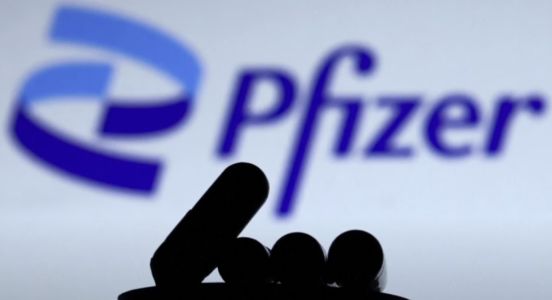Pharma giant pulls plug on new drug after concerning trial result
- Replies 0
In a surprising turn, a major pharmaceutical company has decided to step back from one of its anticipated weight loss treatments.
The move follows an unexpected development during early trials, raising fresh questions about safety and timing.
While interest in medical solutions for weight loss continues to soar, this latest shift shows just how unpredictable the landscape can be.
Pfizer has ended development of its experimental weight loss pill after a patient suffered a possible liver injury believed to be linked to the drug.
The company had been working on danuglipron, an oral GLP-1 medication designed to replicate the weight loss effects of Ozempic in pill form.
Dr. Chris Boshoff, Pfizer’s Chief Scientific Officer, stated on April 14, “While we are disappointed to discontinue the development of danuglipron, we remain committed to evaluating and advancing promising programs in an effort to bring innovative new medicines to patients.”
The patient in question, whose identity was not revealed, reportedly had no visible liver-related symptoms despite the injury.

Pfizer noted in its official statement that over 1,400 participants took danuglipron, and the rate of elevated liver enzymes among them was comparable to those seen with other approved GLP-1 drugs for weight management.
Still, one participant experienced a “potential drug-induced liver injury,” which was “resolved” after they discontinued use of the medication.
It’s unclear what specific type of liver damage the patient had, or whether it was directly tied to enzyme elevation—though such increases can potentially lead to liver cancer if left unchecked.
At the time of the incident, the once-daily version of danuglipron was undergoing early-stage testing as researchers worked to identify the ideal dosage.
Also read: Act fast! How shoppers from this pharmacy giant can claim their share of the massive $100 million settlement
Pfizer had planned to advance the drug into late-stage clinical trials—the final step before submitting a new treatment to regulatory agencies—but ultimately decided to terminate development after learning of the injury.
Despite this outcome, Dr. Boshoff reaffirmed Pfizer’s commitment to the field of obesity treatment.
“Cardiovascular and metabolic diseases including obesity remain important areas of unmet medical need, and we plan to continue applying our global capabilities to advance a pipeline of investigational treatments that have the potential to fill critical gaps in patient care, including continued development of our oral GIPR antagonist candidate and other earlier obesity program.”
Pfizer also shared that data from the danuglipron program will eventually be presented at a scientific conference or published in a peer-reviewed journal.
The weight loss drug market has recently experienced rapid growth, although most options currently come in injectable form.
Ozempic, originally developed for diabetes but widely used for weight loss, brought in approximately $16.7 billion in U.S. sales in 2024 alone, with more than 15 million Americans holding prescriptions.
Mounjaro, another GLP-1 drug that gained traction in 2024 for its weight loss effects, generated $3.5 billion in sales during the last quarter.
Source: WHAS11 / Youtube.
To date, Novo Nordisk’s Rybelsus is the only FDA-approved oral GLP-1 drug, used for treating Type 2 diabetes. It earned about $3.38 billion in sales in 2024.
In 2023, Pfizer had already dropped its twice-daily version of danuglipron after more than 50% of trial participants withdrew due to recurring nausea and vomiting.
Read next: Popular Amazon supplement just got recalled—are you still using it?

Would you opt for medical weight loss or stick to traditional diet and exercise? How much testing do you think a new weight loss drug should go through before it hits the market? Share your thoughts in the comments below!
The move follows an unexpected development during early trials, raising fresh questions about safety and timing.
While interest in medical solutions for weight loss continues to soar, this latest shift shows just how unpredictable the landscape can be.
Pfizer has ended development of its experimental weight loss pill after a patient suffered a possible liver injury believed to be linked to the drug.
The company had been working on danuglipron, an oral GLP-1 medication designed to replicate the weight loss effects of Ozempic in pill form.
Dr. Chris Boshoff, Pfizer’s Chief Scientific Officer, stated on April 14, “While we are disappointed to discontinue the development of danuglipron, we remain committed to evaluating and advancing promising programs in an effort to bring innovative new medicines to patients.”
The patient in question, whose identity was not revealed, reportedly had no visible liver-related symptoms despite the injury.

Pfizer has halted the development of its oral GLP-1 weight loss drug, danuglipron, due to concerns over a potential drug-induced liver injury. Image source: WHAS11 / Youtube.
Pfizer noted in its official statement that over 1,400 participants took danuglipron, and the rate of elevated liver enzymes among them was comparable to those seen with other approved GLP-1 drugs for weight management.
Still, one participant experienced a “potential drug-induced liver injury,” which was “resolved” after they discontinued use of the medication.
It’s unclear what specific type of liver damage the patient had, or whether it was directly tied to enzyme elevation—though such increases can potentially lead to liver cancer if left unchecked.
At the time of the incident, the once-daily version of danuglipron was undergoing early-stage testing as researchers worked to identify the ideal dosage.
Also read: Act fast! How shoppers from this pharmacy giant can claim their share of the massive $100 million settlement
Pfizer had planned to advance the drug into late-stage clinical trials—the final step before submitting a new treatment to regulatory agencies—but ultimately decided to terminate development after learning of the injury.
Despite this outcome, Dr. Boshoff reaffirmed Pfizer’s commitment to the field of obesity treatment.
“Cardiovascular and metabolic diseases including obesity remain important areas of unmet medical need, and we plan to continue applying our global capabilities to advance a pipeline of investigational treatments that have the potential to fill critical gaps in patient care, including continued development of our oral GIPR antagonist candidate and other earlier obesity program.”
Pfizer also shared that data from the danuglipron program will eventually be presented at a scientific conference or published in a peer-reviewed journal.
The weight loss drug market has recently experienced rapid growth, although most options currently come in injectable form.
Ozempic, originally developed for diabetes but widely used for weight loss, brought in approximately $16.7 billion in U.S. sales in 2024 alone, with more than 15 million Americans holding prescriptions.
Mounjaro, another GLP-1 drug that gained traction in 2024 for its weight loss effects, generated $3.5 billion in sales during the last quarter.
Source: WHAS11 / Youtube.
To date, Novo Nordisk’s Rybelsus is the only FDA-approved oral GLP-1 drug, used for treating Type 2 diabetes. It earned about $3.38 billion in sales in 2024.
In 2023, Pfizer had already dropped its twice-daily version of danuglipron after more than 50% of trial participants withdrew due to recurring nausea and vomiting.
Read next: Popular Amazon supplement just got recalled—are you still using it?
Key Takeaways
- Pfizer has halted the development of its oral GLP-1 weight loss drug, danuglipron, due to concerns over a potential drug-induced liver injury.
- The decision to cease the drug's development came after a patient in the trial showed elevated liver enzymes, which can lead to liver cancer over time.
- Despite stopping danuglipron's development, Pfizer remains committed to its research in the cardiovascular and metabolic disease field, including obesity treatments.
- Weight loss medications have been in demand, particularly injectable ones like Ozempic and its sister drug Mounjaro, with sales reaching billions of dollars.
Would you opt for medical weight loss or stick to traditional diet and exercise? How much testing do you think a new weight loss drug should go through before it hits the market? Share your thoughts in the comments below!






